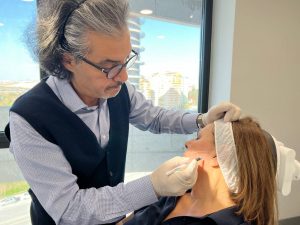Teeth Grinding Treatment
Teeth Grinding and Face Thinning Treatment with Botox

Studies have shown that Botulinum Toxin is effective in the treatment of Bruxism, also known as teeth grinding and clenching, and that it relieves patients. The application should be done on the muscles involved in teeth clenching. these muscles include the masseter muscle and temporomandibular muscle.
Botulinum toxin injection is the most popular non-surgical aesthetic procedure worldwide and is undoubtedly an effective approach to treating the signs of aging. Additionally, it can be used for facial contouring if injected into the correct muscle groups.
Botulinum toxin injected into the masseters effectively shapes the jawline by relaxing the muscles and thus reducing thickness. This also relieves teeth grinding symptoms and other related mandibular joint pain syndrome problems.
What are the problems caused by teeth clenching and grinding (bruxism)?
Clenching and severe teeth grinding is a serious health problem that, in addition to disrupting your sleep, can damage your face shape, teeth, jaw, and overall oral health. However, this problem can relieve you of teeth clenching and grinding with Botox .
We can list these problems as follows:
- Pain : Teeth grinding and clenching puts constant stress and pressure on the jaw joints and surrounding muscles. You may experience jaw pain and stiffness, facial pain, and even earaches from frequent grinding.
- Jaw disorders : Grinding can cause temporomandibular joint disorders by affecting the structure of the joints and muscles that form the jaw, causing severe facial, neck and shoulder pain and difficulty in chewing, speaking and swallowing.
- Tooth damage. Tooth damage is a leading side effect of clenching and grinding. Frequent grinding can erode tooth surfaces and enamel, causing height loss and increased tooth sensitivity. Additionally, constant stress and pressure can crack, chip, break, or loosen teeth.
- Receding gums : Bruxism is the leading cause of gum recession. Grinding causes teeth to shift and loosen, creating pockets into which bacteria enter, causing the gums to pull away from the teeth.
- Headache: Grinding can cause painful migraines and tension headaches from the constant stress and pressure placed on the facial and jaw muscles.
What are the Types and Types of Teeth Clenching and Grinding?
It is mostly classified according to when it occurs.
a. Awake bruxism: Occurs while the person is awake.
b. Sleep bruxism: It occurs while the person is asleep.
c. Combined bruxism: This is present in both conditions.
Sleep bruxism is actually considered a sleep-related movement disorder. People who clench or grind their teeth during sleep are more likely to have other sleep disorders, such as snoring and pauses in breathing, or sleep apnea.
Mild clenching and grinding may not require treatment. However, in some people, bruxism can be severe enough to cause jaw disorders, headaches, and tooth damage.
Since we may have sleep bruxism and be unaware of it until complications develop, it is important to know the signs and symptoms of teeth clenching and grinding and to have traces of it checked at regular dentist visits.
What are the symptoms of Bruxism (Teeth Clenching/Grinding)?
• Teeth grinding or clenching loud enough to wake your sleeping companion
• Flattened, broken, chipped, or loosened teeth
• Worn tooth enamel, exposing deeper layers of your tooth
• Increased tooth pain or sensitivity
• Tired or tight jaw muscles or a locked jaw that does not open and close completely
• Jaw, neck or facial pain or ache
• Pain that feels like an earache even though there is no problem with your ear
• Dull headache that starts in the temples
• Damage from chewing the inside of your cheek
• Sleep disturbance
When Should I See a Doctor?
If you have any of the symptoms listed above and have other concerns about your teeth or jaw, you should see a specialist before the process progresses any further.
Starting treatment early will save you from pain, dental problems and changes in the shape of your face.
What Causes Teeth Clenching (Teeth Grinding)?
It is difficult to understand exactly what causes bruxism (teeth grinding). Among the reasons; genetic factors, personality structure, medications, neurological and psychological problems, stress and sleep disorders. Or it may be a combination of physical, psychological and genetic factors.
In addition, intraoral problems, decayed or missing teeth, and incorrectly made dentures can also be counted among the reasons for clenching.
Awake bruxism; It can be caused by emotions such as anxiety, stress, anger, frustration or tension. Or it may be a coping strategy or a habit during deep concentration.
Sleep bruxism may be a sleep-related chewing activity associated with arousals during sleep.
What are the Risk Factors for Teeth Grinding?
The following factors increase your risk of bruxism:
- Stress. Increased anxiety or stress can cause teeth grinding. There may also be anger and frustration.
- Age. Bruxism is common in young children, but usually goes away by adulthood.
- Personality type. Having an aggressive, competitive, or hyperactive personality type may increase your risk of bruxism.
- Medicines and other substances. Bruxism can be a rare side effect of some psychiatric medications, such as some antidepressants. Smoking tobacco, drinking caffeinated beverages or alcohol, or using recreational drugs may increase the risk of bruxism.
- Family members with bruxism. Sleep bruxism tends to run in families. If you have bruxism, other members of your family may also have bruxism or a history of bruxism.
- Other disorders. Bruxism may be associated with certain psychological conditions and medical disorders, such as Parkinson’s disease, dementia, sleep-related disorders such as gastroesophageal reflux disorder (GERD), epilepsy, night terrors, sleep apnea, and attention-deficit/hyperactivity disorder (ADHD).
Side Effects of Teeth Grinding and Clenching
In most cases, bruxism does not cause serious complications. But severe bruxism can lead to:
- It may cause damage to the dental anatomy, coatings or bones.
- It can cause tension headaches and severe facial or jaw pain.
- Disorders that occur in the temporomandibular joints (TMJ) located just in front of your ears, which may sound like a clicking sound when you open and close your mouth.
What is the Treatment of Teeth Clenching (Grinding)?
It is based on the principle of relaxing the masseter muscle, which causes teeth clenching. For this purpose, injections of botulinum toxin (Dysport, Botox) cause muscle relaxation and a relaxation process that lasts for about 3-6 months. Apart from this, oral protectors and psychological support treatments can be applied.
However, treatments based on behavior change such as habit awareness, habit reversal therapy, relaxation techniques and biofeedback mass therapy, and occlusal tooth structure disorders should be treated by dentists.
How to Treat Teeth Clenching (Grinding)?
It involves deep injections into the masseter muscle, involving all parts of the muscle. The needle used is a thin needle with a thickness of 32G and patients generally do not feel pain.
How to Treat Bruxism (Teeth Grinding)?
It can be corrected by eliminating the factors that cause teeth grinding. The reasons explained above must be understood and the factors must be evaluated one by one.
What Causes Teeth Clenching (Teeth Grinding)?
It manifests itself as forced closing or clenching of opposing teeth in opposing positions as the mandibular bone moves.
It could be due to many reasons. In recent years, it has been reported that anxiety and stress disorders are the most common causes of this.
How is Bruxism (Teeth Grinding) Diagnosed?
Generally, the patient’s history is sufficient. However, in some cases, dentists can detect tooth impaction and jaw bone deterioration due to clenching through examination and radiological examinations.
What are the symptoms of Bruxism (Teeth Clenching/Grinding)?
Patients usually notice headache, difficulty in opening the mouth, restlessness and tension when they wake up in the morning. Teeth grinding occurs mostly when the partner hears the sound and notices the movements. If injection treatments do not yield results in patients who have teeth clenching problems while sleeping, a teeth clenching device is recommended.
How Long Does the Effect of Teeth Clenching Botox Last?
The effect of Botox in teeth grinding treatments lasts for 3-6 months. However, the duration may increase with the frequency of application.
What are the complications that may arise with bruxism (teeth grinding)?
Complications usually occur in the oral bone joints. It causes joint cartilage disorders.
Is Jaw Joint Disease Caused by Grinding My Teeth?
There is more than one cause of jaw joint disease. However, the patient’s teeth clenching and teeth grinding problems may trigger or increase jaw joint disease.
Why do I hear noises coming from my jaw when I yawn or eat? Could my jaw be dislocated?
The sounds coming from the jaw while eating or yawning are considered normal to a certain extent. Clenching and grinding of the teeth along with excessive strength of the jaw muscles may cause slippage in the jaw disc. The patient should stop the habit of grinding his teeth.
Every Time I Yawn, My Jaw Stays Open, I Have Difficulty Closing It. Is There a Treatment?
In patients whose teeth clenching and grinding problems have been going on for a long time, it may take time for the jaw to return to its original position after yawning. The patient may have difficulty closing his jaw. With Botox treatment applied to the mandibular muscle, the strength of the jaw muscle can be relieved, allowing the patient to feel pain and allowing the jaw to move easily.
Could my jaw joint disorder be the cause of my headache?
Jaw joint pain can often be confused with earache or headache. This condition, which is frequently observed in patients with teeth clenching and grinding problems, is caused by the jaw muscles working more than normal.
Does Chin Botox Make the Face Thinner?
In the treatment of teeth clenching, this muscle is relaxed by botox injection applied to the masseter muscle in the jaw area. When the muscle does not work as it used to, it will soften and shrink, and the angular appearance on the chin will become thinner, resulting in a more feminine face shape.
Teeth Clenching Treatment Prices 2024
Processing fees and prices are related to the dose and amount of medicine to be administered.
Is Bruxism Botox Treatment a Painful Procedure?
Since it is performed using 32G needles, it can be said to be almost painless.
When Does Botox Work in the Treatment of Bruxism?
The effect of Botox usually begins within 2-3 days after the procedure and subsides within 15 days. Control procedures are carried out within 10-15 days and additional doses are applied if necessary.
Is Bruxism Botox Method a Permanent Treatment?
Unfortunately, when the Botox effect ends within 3-6 months, repeated applications are required.
What are the Contraindications for Botox?
- Pregnancy and breastfeeding,
- Presence of an active infection in the treatment area,
- History of active neuromuscular disease.

